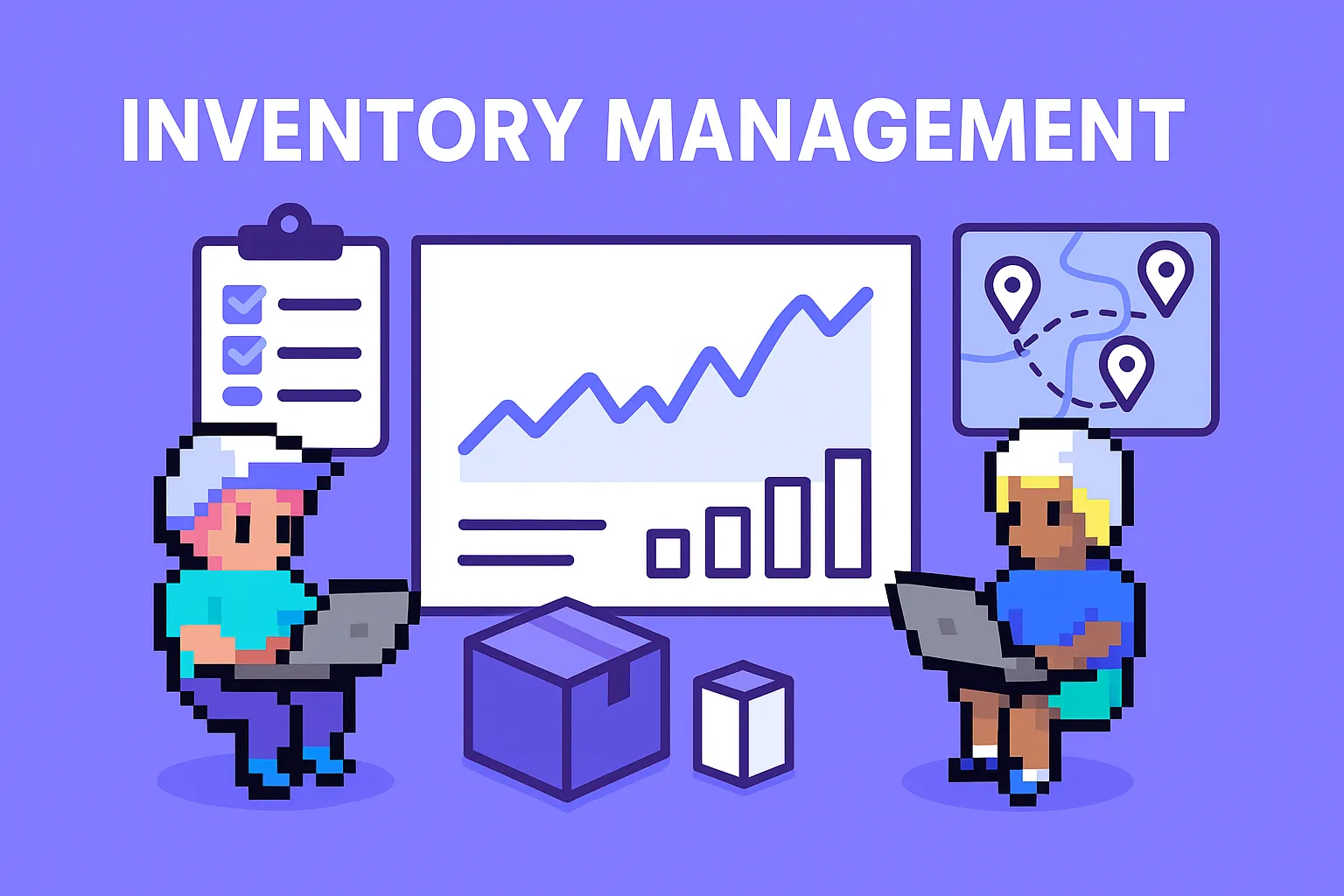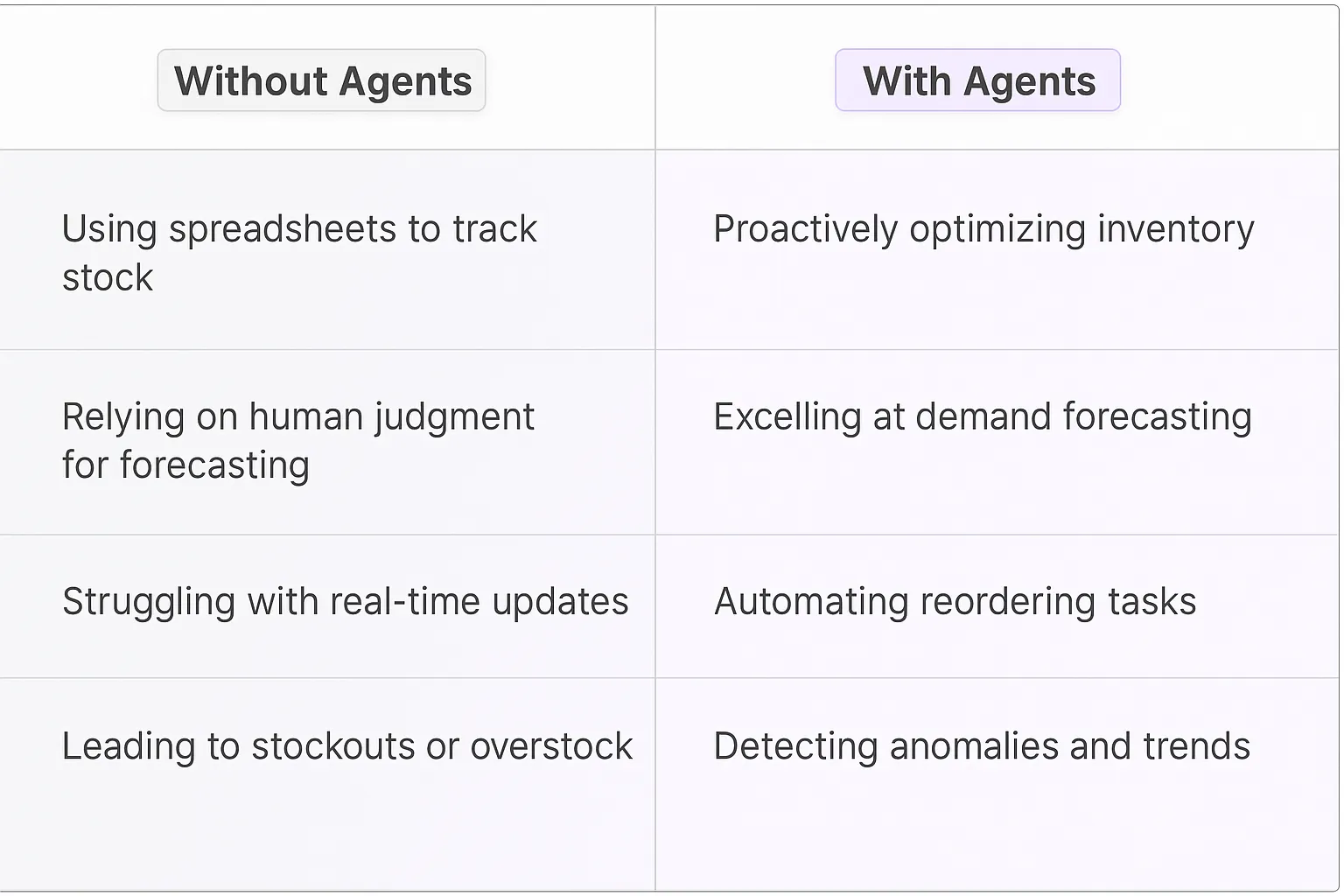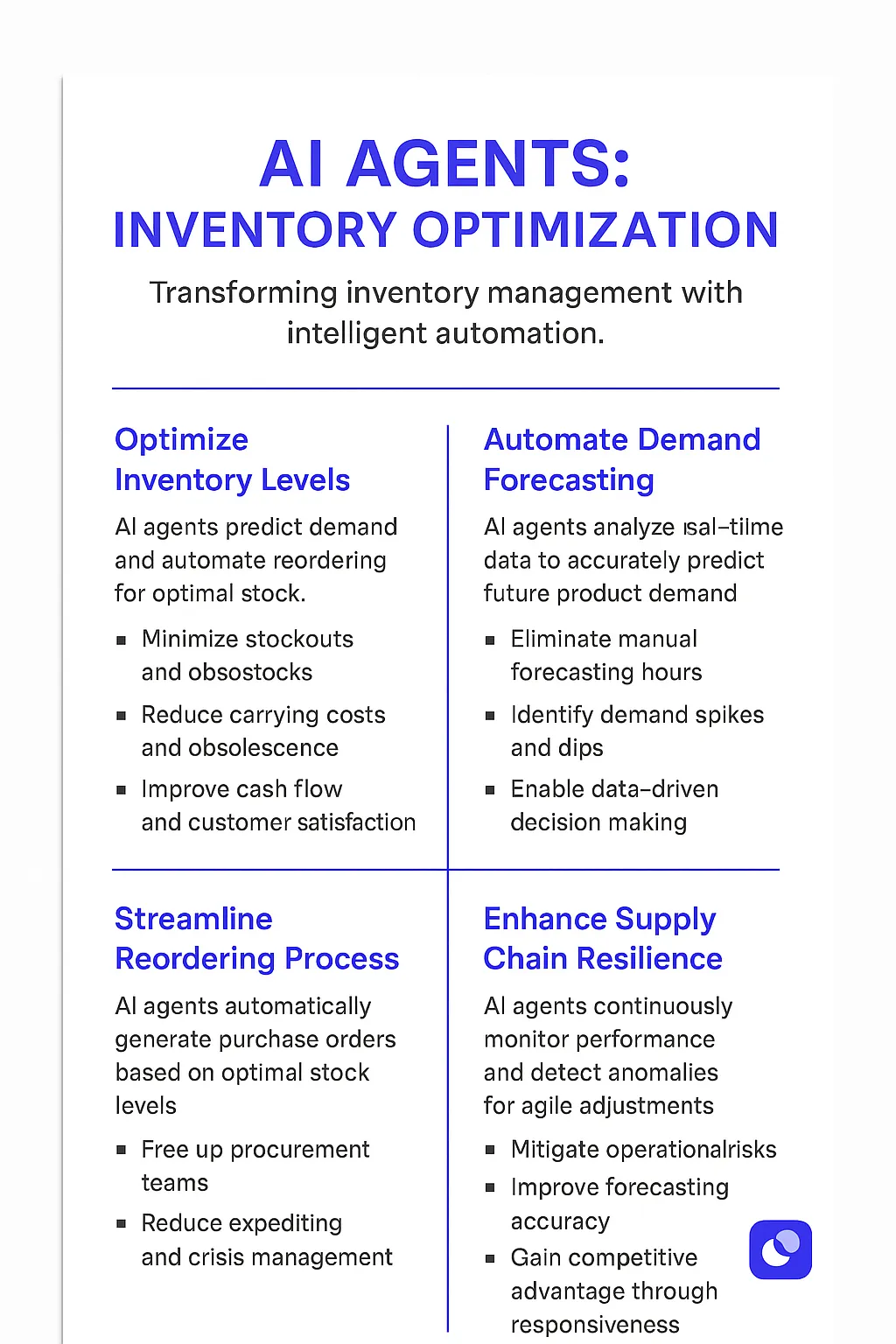Inventory Management AI Agents
The Evolution of Inventory Management with AI
What is Inventory Management?
Inventory management is the art and science of maintaining optimal stock levels to meet customer demand while minimizing costs. It's a critical business function that involves tracking, ordering, storing, and utilizing inventory across the supply chain. In the past, this process relied heavily on manual efforts and basic software. Today, AI agents are redefining what's possible in inventory management.
Key Features of Inventory Management
Modern inventory management, powered by AI agents, boasts several key features:1. Predictive demand forecasting: AI analyzes vast datasets to predict future demand with unprecedented accuracy.2. Real-time optimization: Continuous monitoring and adjustment of stock levels across multiple locations.3. Automated reordering: AI-driven systems that can place orders without human intervention.4. Anomaly detection: Identifying unusual patterns that may indicate fraud, errors, or emerging trends.5. Dynamic pricing: Adjusting prices based on demand, competition, and other factors.6. Supplier relationship management: Tracking and optimizing supplier performance.7. Multi-channel inventory sync: Ensuring consistent stock levels across various sales channels.

Benefits of AI Agents for Inventory Management
What would have been used before AI Agents?
Before AI agents entered the scene, inventory management was a manual, time-consuming process. Companies relied on spreadsheets, basic software, and human intuition to track stock levels, predict demand, and manage supply chains. This approach was prone to errors, inefficiencies, and missed opportunities.
Traditional inventory systems often struggled with real-time updates, leading to stockouts or overstock situations. Demand forecasting was based on historical data and gut feelings, missing out on the nuanced patterns that AI can detect. The result? Tied-up capital, warehouse inefficiencies, and frustrated customers.
What are the benefits of AI Agents?
AI agents are transforming inventory management from a reactive to a proactive discipline. These digital teammates bring a level of intelligence and automation that's reshaping how businesses handle their stock.
First off, AI agents excel at demand forecasting. They crunch vast amounts of data - sales history, market trends, even weather patterns - to predict future demand with uncanny accuracy. This isn't just about avoiding stockouts; it's about optimizing working capital and improving cash flow.
But the real game-changer is in real-time inventory optimization. AI agents continuously monitor stock levels, sales velocity, and supply chain dynamics. They can automatically reorder products, adjust stock levels across multiple locations, and even negotiate with suppliers for better terms. It's like having a tireless inventory manager who never sleeps and always makes data-driven decisions.
Another killer feature? Anomaly detection. AI agents can spot unusual patterns in sales or inventory levels that might indicate fraud, data errors, or emerging market trends. This early warning system can save companies millions and uncover hidden opportunities.
Let's talk about the ripple effects. By optimizing inventory, AI agents free up capital that can be reinvested in growth initiatives. They reduce the need for safety stock, minimizing carrying costs. And by ensuring products are always in stock, they boost customer satisfaction and loyalty.
The beauty of AI agents in inventory management is their ability to learn and improve over time. As they process more data and observe the outcomes of their decisions, they become smarter and more accurate. It's a virtuous cycle of continuous improvement that traditional systems simply can't match.
In essence, AI agents are turning inventory management from a cost center into a strategic advantage. They're not just managing stock; they're unlocking growth opportunities and driving competitive edge in ways we're only beginning to understand.

Potential Use Cases of AI Agents with Inventory Management
Processes
AI agents are reshaping inventory management, bringing a level of precision and adaptability that's frankly mind-blowing. These digital teammates are not just crunching numbers; they're becoming the backbone of smart, responsive supply chains.
One of the most impactful processes these AI agents handle is demand forecasting. They're constantly analyzing sales data, market trends, and even external factors like weather patterns or social media sentiment. This isn't your grandfather's inventory prediction - it's a dynamic, ever-evolving model that adapts in real-time.
Another game-changing process is automated reordering. AI agents don't just wait for stock to hit a predetermined level. They're proactively adjusting reorder points based on lead times, supplier performance, and demand fluctuations. It's like having a tireless inventory manager who never sleeps and always stays ahead of the curve.
Tasks
When it comes to specific tasks, AI agents are absolute workhorses. They're tackling the grunt work that used to bog down human teams, but with a level of sophistication that's truly next-level.
Take stock level optimization, for instance. These digital teammates are continuously balancing the tightrope between overstocking and stockouts. They're not just looking at historical data, but factoring in everything from seasonal variations to the latest TikTok trends that could spike demand overnight.
Another task where AI agents shine is in identifying slow-moving inventory. They're not just flagging items that haven't moved in a while. They're analyzing why these products are stagnating and suggesting strategies to move them - whether it's bundling, discounting, or even recommending alternative markets where demand might be higher.
Perhaps most impressively, these AI agents are revolutionizing the way we handle supplier relationships. They're tracking supplier performance with meticulous detail, flagging issues before they become problems, and even suggesting alternative suppliers based on a complex web of factors including price, quality, and reliability.
The beauty of these AI agents is that they're not just executing tasks - they're learning and improving with every interaction. It's like having a team member who's constantly upskilling, but at a pace no human could match.
In the world of inventory management, AI agents are quickly becoming indispensable. They're not replacing human expertise, but augmenting it in ways we're only beginning to fully appreciate. As these digital teammates continue to evolve, they're going to unlock levels of efficiency and responsiveness that will redefine what we thought was possible in supply chain management.

Industry Use Cases
The versatility of AI agents in inventory management makes them valuable across various industries. Let's dive into some meaty, industry-specific use cases that showcase how AI can transform workflows and processes. These aren't your run-of-the-mill examples – we're talking about AI that's so integrated, it feels like it's been part of the team since day one.
From retail giants to mom-and-pop shops, from sprawling warehouses to compact stockrooms, AI is rewriting the rules of inventory management. It's not just about keeping track of stuff anymore; it's about predicting demand with uncanny accuracy, optimizing stock levels in real-time, and even automating reordering processes. These digital teammates are becoming the unsung heroes of supply chain efficiency.
But here's the kicker: the impact of AI in inventory management isn't just about efficiency gains or cost savings. It's about unlocking new business models, enabling hyper-personalization at scale, and creating entirely new categories of products and services. We're seeing companies leverage AI to not just manage inventory, but to fundamentally rethink their entire approach to product lifecycle management.
So buckle up as we explore how different industries are harnessing the power of AI to turn inventory management from a necessary evil into a strategic advantage. These use cases aren't just theoretical – they're happening right now, reshaping industries and setting new benchmarks for what's possible in the world of inventory management.
Retail Revolution: AI-Powered Inventory Management
Let's talk about how AI is reshaping retail inventory management. It's not just about keeping shelves stocked anymore; it's about predicting consumer behavior with scary accuracy.
Picture a bustling department store. Traditionally, inventory managers would rely on historical data and gut instinct to predict what items to stock. But that's like trying to navigate a ship with a compass in a world of GPS.
Enter AI-powered inventory management. These digital teammates are crunching massive amounts of data - past sales, social media trends, weather forecasts, local events, and even macroeconomic indicators. They're spotting patterns humans could never see.
For instance, an AI might notice that sales of umbrellas spike not just when it rains, but three days before forecasted rainfall. Or that demand for certain fashion items correlates with specific celebrity Instagram posts. This level of granular insight allows retailers to stock precisely what customers want, when they want it.
But it goes beyond just predicting demand. These AI agents are optimizing the entire supply chain. They're determining the most efficient reorder points, suggesting optimal pricing strategies, and even predicting potential supply chain disruptions.
The result? Retailers using AI for inventory management are seeing reduced stockouts, lower carrying costs, and increased sales. They're able to be more nimble, responding to trends in real-time rather than playing catch-up.
This isn't just a nice-to-have. In the cutthroat world of retail, where margins are razor-thin and competition is fierce, AI-powered inventory management is becoming a must-have. It's the difference between thriving and barely surviving.
The retailers who embrace this tech will have a significant edge. Those who don't? Well, they might find themselves going the way of Blockbuster in a Netflix world.
Manufacturing Mastery: AI Agents Redefine Inventory Control
The manufacturing sector is undergoing a seismic shift, and AI-powered inventory management is at the epicenter. This isn't your grandfather's factory floor anymore - it's a high-tech playground where digital teammates are calling the shots.
Take a typical automotive manufacturing plant. Traditionally, inventory management was a complex dance of spreadsheets, gut feelings, and hoping for the best. Now? AI agents are orchestrating a symphony of efficiency that would make even the most seasoned operations manager's jaw drop.
These AI systems are ingesting data from every conceivable source - supplier lead times, production schedules, quality control metrics, even geopolitical events that could impact the supply chain. They're not just reacting to demand; they're anticipating it with uncanny precision.
For example, an AI might detect a subtle increase in orders for red cars in the Midwest, correlating it with an upcoming sports event. It then adjusts the inventory of red paint and related components accordingly, weeks before a human would have noticed the trend.
But here's where it gets really interesting. These AI agents aren't just managing inventory - they're optimizing the entire production ecosystem. They're dynamically adjusting production schedules to minimize waste, predicting equipment maintenance needs to prevent costly downtime, and even suggesting design tweaks that could streamline the manufacturing process.
The impact? Manufacturers leveraging AI for inventory management are seeing dramatic reductions in carrying costs, near-elimination of stockouts, and significant improvements in cash flow. They're able to operate with leaner inventories without sacrificing production capacity or customer satisfaction.
This isn't just about efficiency - it's about survival. In an industry where margins are often measured in fractions of a percent, AI-powered inventory management is becoming the great differentiator. It's the secret weapon that allows manufacturers to be agile in a world where consumer preferences can change overnight.
The manufacturers who embrace this technology will be the ones writing the next chapter of industrial history. Those who don't? They might find themselves relegated to the footnotes, wondering how they missed the AI revolution that was happening right under their noses.
Considerations
Technical Challenges
Implementing an Inventory Management AI Agent isn't just about slapping some machine learning algorithms onto your existing systems. It's a complex dance of data, infrastructure, and algorithms that requires careful choreography.
First off, data quality is the foundation. Your AI is only as good as the data it's trained on. In many businesses, inventory data is scattered across multiple systems, often inconsistent, and sometimes just plain wrong. Cleaning this up is like untangling a massive ball of yarn – tedious, time-consuming, but absolutely necessary.
Then there's the issue of real-time processing. An effective Inventory Management AI needs to make decisions on the fly. This means your infrastructure needs to handle constant data streams and quick computations. It's not just about having powerful hardware; your entire data pipeline needs to be optimized for speed and reliability.
Integration with existing systems is another hurdle. Your shiny new AI needs to play nice with your legacy ERP, your supplier databases, and possibly even IoT devices on your warehouse floor. This isn't just a technical challenge; it's a diplomatic mission to get different departments and systems to cooperate.
Operational Challenges
On the operational side, implementing an Inventory Management AI Agent is like introducing a new team member who speaks a different language. There's a learning curve, and it goes both ways.
Training your staff to work alongside this digital teammate is crucial. It's not just about teaching them to use a new interface; it's about fostering trust in the AI's decisions. When the AI suggests ordering 10,000 units of a product that's never sold well before, will your purchasing manager have the confidence to follow through?
There's also the challenge of change management. Inventory management often involves deeply ingrained processes and habits. Introducing an AI that might completely upend these can lead to resistance. You're not just implementing technology; you're reshaping workflows and, potentially, entire job roles.
Accountability is another thorny issue. When inventory decisions are made by an AI, who's responsible for the outcomes? This isn't just about assigning blame when things go wrong; it's about creating a culture where humans and AI collaborate effectively, each leveraging their unique strengths.
Finally, there's the ongoing challenge of optimization. An Inventory Management AI isn't a set-it-and-forget-it solution. It needs constant fine-tuning based on changing market conditions, new product lines, or shifts in supply chain dynamics. This requires a dedicated team that understands both the business context and the AI's inner workings – a rare and valuable combination of skills.
Implementing an Inventory Management AI Agent is a journey, not a destination. It's about creating a symbiosis between human expertise and machine efficiency. When done right, it's not just about managing inventory; it's about unlocking new levels of business intelligence and agility.
Embracing AI: The Future of Strategic Inventory Management
AI agents are not just enhancing inventory management; they're completely redefining it. These digital teammates are turning what was once a cost center into a strategic advantage. By leveraging AI's ability to process vast amounts of data, make real-time decisions, and continuously learn, businesses can achieve levels of efficiency and accuracy that were previously unimaginable.
The impact goes beyond just optimizing stock levels. AI-powered inventory management is freeing up capital, improving customer satisfaction, and enabling businesses to be more agile in responding to market changes. It's allowing companies to operate leaner, move faster, and make smarter decisions.
As AI technology continues to evolve, we can expect even more sophisticated applications in inventory management. The businesses that embrace this technology now will be best positioned to thrive in an increasingly competitive and fast-paced market. The future of inventory management is here, and it's powered by AI.













